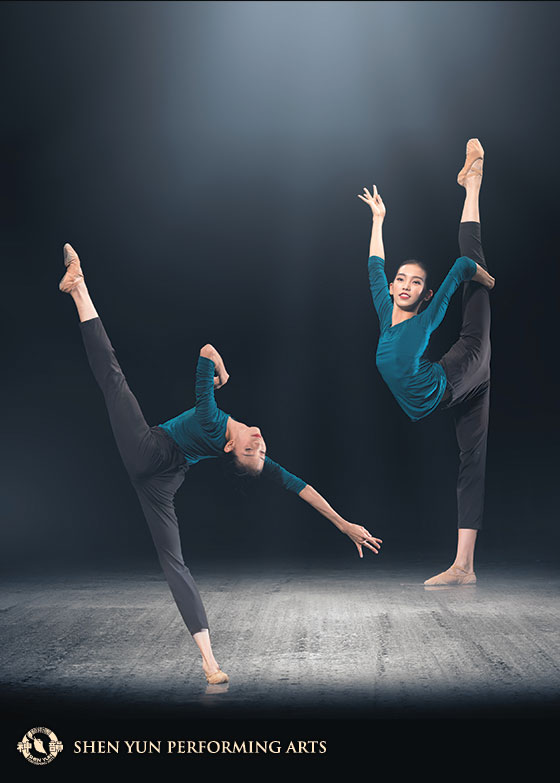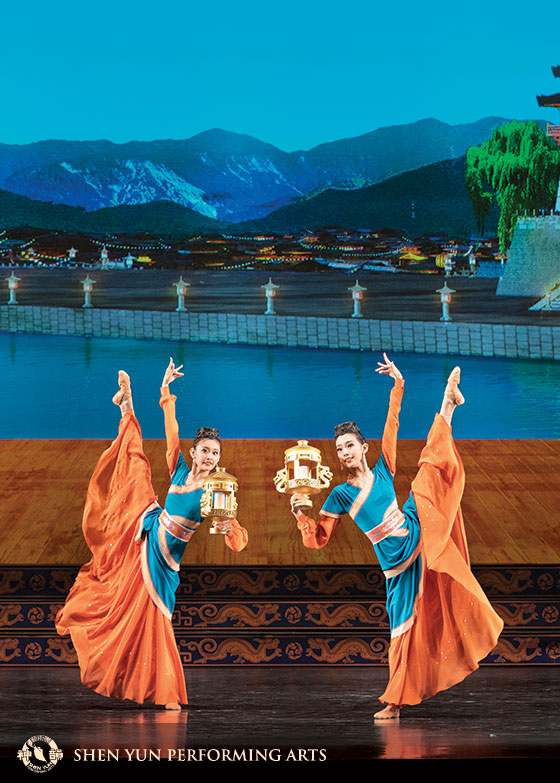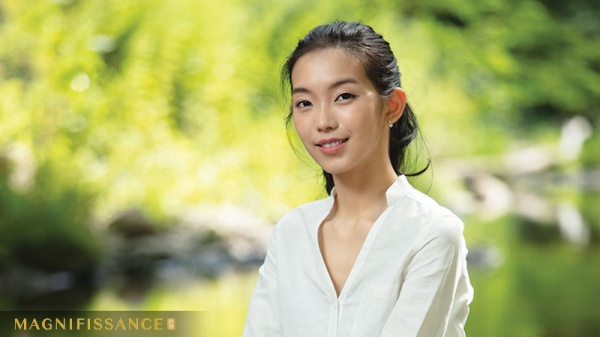Magnifissance Magazine is France and Canada's leading bilingual luxury lifestyle magazine in Chinese and English, dedicated to bridging East and West through a shared appreciation for the beauty and elegance rooted in both traditions.
In this issue, Magnifissance features Shen Yun lead dancer Luna Yu. Yu has been with Shen Yun since 2017. In 2018, she won third place in New Tang Dynasty Television’s International Classical Chinese Dance Competition (junior female division) and second place in the same competition in 2021.
From Magnifissance’s: Beauty Awakens the Soul
Great art carries its own sense of luxury. This goes beyond high price tags and status symbols. Even record-breaking auction prices don’t represent the full value of a classic painting, sculpture, or other works of fine art. These incredible expressions of beauty even transcend the material realm. We often see that the sensory experiences and miraculous feelings generated by classical works of art are actually amplified over the course of history. For hundreds and even thousands of years, the shared experiences of generations deepen the meaning of art and inspire a continuous pursuit of beauty, understanding, and spiritual significance.
In this era of unprecedented technology, the varieties of art have compounded and our ability to find and view art has reached new heights, but our connection to art and our ability to appreciate beauty have been diluted. Take mainland China as an example. Starting with Mao’s Cultural Revolution (1966–1976), many classical forms of art have been abandoned, while countless techniques and inner meanings that built Chinese civilization have almost disappeared.
In 2006, a group of classical Chinese artists established Shen Yun Performing Arts in New York, where they found the artistic freedom to fully explore this ancient heritage. Together, they began a journey of reviving the divinely bestowed Chinese culture and spreading it to the world.
Shen Yun now tours the world every year. Its unique orchestra combines Eastern and Western instruments to create a style of music all of its own, while the dancers bring ancient heroes and epic stories to life in front of grand animated backdrops. Celebrities and professionals worldwide have hailed Shen Yun’s performances as the best in the world. After a long hiatus due to the pandemic, tShen Yun is now beginning to tour again with an all-new program.
A little over three years ago, dancer Luna Yu fulfilled her dream of becoming a principal dancer with Shen Yun. After years of study and hundreds of performances, Yu has developed a deeper understanding of artistry.
“It’s important to maintain high aesthetic standards to bring out the meaning of a performance and create an experience of beauty for the audience,” she says. But what is the standard of beauty for classical Chinese dance? Yu says it comes from two long-lost techniques revived by Shen Yun’s artistic director, D.F.

Rediscovering brilliant dance techniques
According to Shen Yun’s website, classical Chinese dance, martial arts, and operatic dance all share the same roots in ancient Chinese culture. They have been influencing and learning from each other throughout the generations with overlapping movements and poses (shen-fa) and bearing (shen-yun). Within the concept of shen-fa, there are two special techniques for dance, and these are the two secrets that unlocked Yu’s artistry. One is “the body leads the hands,” which has been passed down for thousands of years, though very few people today were aware of it outside of Shen Yun. The other is even more advanced and had previously disappeared. It’s called “the hips lead the legs.”
Both techniques focus on the body’s movement originating from the centre, then flowing out to the limbs, creating a sense that the arms and legs are infinitely stretched. With the upper body, the force starts from between the shoulders and extends fluidly all the way to the fingers. With “the hips lead the legs,” the movement starts at the waist before moving through the pelvis and into the legs.
Dance is the art of the body, and by elongating the movement of the limbs through these shen-fa techniques, dancers can then use their bodies to express deeper emotions and create the appearance of effortless motion.
Beauty originates from self-control
In order to achieve the advanced shen-fa of “the body leads the hands” and “the hips lead the legs,” dancers must first have excellent body control. For example, some dancers can lift their legs up over their heads as easily as they raise their arms. They can also perform complex flips and tumbling techniques. Body control is the foundation of dance and includes flexibility, strength, balance, and poise.
Yu has been dancing since the age of six and stretches every day to get her body into difficult positions. “I stretch whenever I have time,” she continues. “My flexibility can only be improved through practice. Even if I don’t see any results for a while, I will continue the practice. Every bit of hard work accumulates, and eventually I’m rewarded.”
A dancer’s pursuit of flexibility has no end. With consistent practice, quantitative practice turns into qualitative change. Yu describes it as the unlocking of her joints and tendons.
In addition to flexibility, muscular strength and endurance are also essential. The first step is to train the muscles to complete the movements. The dancer then repeats the techniques over and over to gain precise control over them. The subtle changes bring out the delicate nature and unique charm of classical Chinese dance. “When repeating the same movements every day, I think about how to do them better; for example, which muscles should I use, and how do I engage them to achieve better balance, to have more explosive power, and so on.”
Yu says that after studying dance for so many years, she has realized that there are no shortcuts to improving. “It’s the persistence day after day and year after year. Accumulating skills bit by bit. It takes a lot of willpower.” This willpower is not only reflected in constant practice, but also in the state of concentration required for the stage. She vividly recalls one of her final performances in 2020 before the tour was cancelled.
“Because of the pandemic, the audience was very small, so I felt a little sad, and my mind wasn’t calm. During the dance “Lantern Grace,” I was the lead dancer and had to hold a pose with the [Chinese] lantern over my head. When I saw a fellow dancer in the front move a little bit, I panicked, and couldn’t stand still the way I was supposed to.” She felt frustrated and apologized to the audience in her mind. Moments later, Yu performed a particularly impressive solo move and the audience erupted with applause. “I felt so moved! The audience wasn’t upset with my mistake and still applauded and encouraged me.”

The experience left Yu with a new level of understanding willpower. “As a dancer, once you’re on that stage, no matter what happens, you have to be very firm in your mind. Manage your nervousness and feelings of panic, devote yourself to completing the performance, and present your best to the audience.”
Those of us lucky enough to have seen a Shen Yun performance can feel this determination behind the dancers, musicians, and the many other artists behind the scenes who dedicate themselves to creating an atmosphere of beauty and awe. The opening scene of a Shen Yun performance often depicts the dancers in a heavenly realm with clouds beneath their feet and glorious temples in the backdrop. Majestic Buddhas, Taoist immortals, and divine beings come to life through the dance and music. A sense of wonder overwhelms the senses and lifts the audience out of the mundane world. Confusion and worries fall away, only a sense of truth and beauty remain. It’s a heart-to-heart connection between the performers and the audience. The beautiful Shen Yun scenes linger long after the tour buses have moved on to the next city, reemerging during life’s challenges to dispel the haze with their bright energy. This has been the experience for many audience members and the hope of every performer like Luna Yu who dances from the heart.




